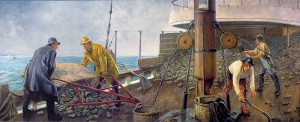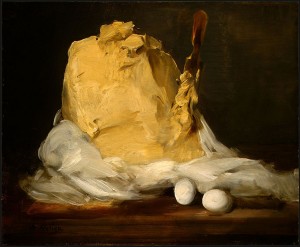
"Jacob Snyder, an oysterman living in Woodhaven, had a bitter experience on Jamaica Bay Thursday night." (Image by Alexander Rummler.)
When they weren’t busy collecting and selling shellfish, 19th-century oystermen were living dramatic lives, as the following trio of Brooklyn Daily Eagle articles demonstrates.
••••••••••
“A Bloody Affray–Murderous Assault of an Oysterman” (September 17, 1887): “At an early hour yesterday morning, John Graham, aged twenty-five years, of No. 53 Harrison Avenue, with two friends, visited the oyster saloon of Adam Christman, No. 416 Broadway, and asked for stews. When they were laid on the table Graham asked fror more butter, which Christman refused to give, much to the annoyance of the former, who threw his oysters into a waste dish, and with his friends got up to leave. Before they had reached the door, Christman, armed with an oyster knife, made a desperate attack on Graham, cutting him severly in the head and face, and inflicting some dangerous wounds. It was with the greatest difficulty that he was disarmed and his victim rescued. Beside the injuries referred to, Graham had his nose almost entirely bitten off during the struggle. Christman, who is thirty years of age, was arrested on a charge of felonious assault by Sergeant Leavey, of the Thirteenth precinct. He was arraigned before Justice Riley to-day, and hold for examination.”
••••••••••

"When they were laid on the table Graham asked fror more butter, which Christman refused to give, much to the annoyance of the former, who threw his oysters into a waste dish." (Image by Antoine Vollon.)
“Old Bob Meets With an Accident” (March 8, 1896): “Henry Young of Flatlands, 93 years of age, known all over the annexed district as Old Bob, met with an accident in Flatlands yesterday afternoon that came within a hair’s breadth of spoiling his prospect of being a centenarian. Old Bob is an oyesterman, and three times a week he may be seen on his yellow wagon, peddling oysters up and down Flatbush Avenue and the side streets. Yesterday afternoon he was just coming to a halt on front of the Ditman residence on Flatbush Avenue, near Avenue C, when a farmer’s wagon, belonging to P.J. Collins of Flatlands, collided with his vehicle. Bob was thrown off his seat with great violence and landed head first in the middle of the car tracks. He was stunned from the shock and unable to rise for several minutes. When he got up he found his wagon a wreck and the farmer’s wagon going up the avenue with the speed of a trolley car. Bob’s horse being a steady animal, stood patiently waiting to see what his master was going to do about it. He left the horse and what was left of the wagon just where they stood and with blood in his white hair, called on Justice Steers to have the driver of the farm wagon arrested.”
••••••••••
“Frozen in His Boat” (January 7, 1893): “Jacob Snyder, an oysterman living in Woodhaven, had a bitter experience on Jamaica Bay Thursday night. His hands, feet and ears were frozen and it is thought amputation of his feet will be necessary. Snyder owns oyster beds at Beach Channel. His grounds have been visited by oyster thieves lately, and on Thursday night the planter, armed with a shot gun, arranged to watch the beds from a rowboat hidden in the thatch, a short distance from the channel. Snyder watched for several hours, taking frequent pulls at a flask of whisky. He fell sleep and did not wake until 3 o’clock, when the storm was at its height. Snyder was benumbed with the cold, but decided to make an attempt to reach the main land. His boat was caught by the wind and blown toward the mouth of the bay. The desperate efforts of the bayman to control the boat were without effect and he became exhausted and lost consciousness. Early yesterday Snyder’s son began a search for his father. The skiff was found on Ruffle Bar. The oysterman lay in the bottom of the boat, still unconscious and nearly frozen to death. A vigorous rubbing partially restored him, but Snyder lost consciousness three times before reaching his home. Physicians were called to attend him and they will make an effort to save his hands.”
